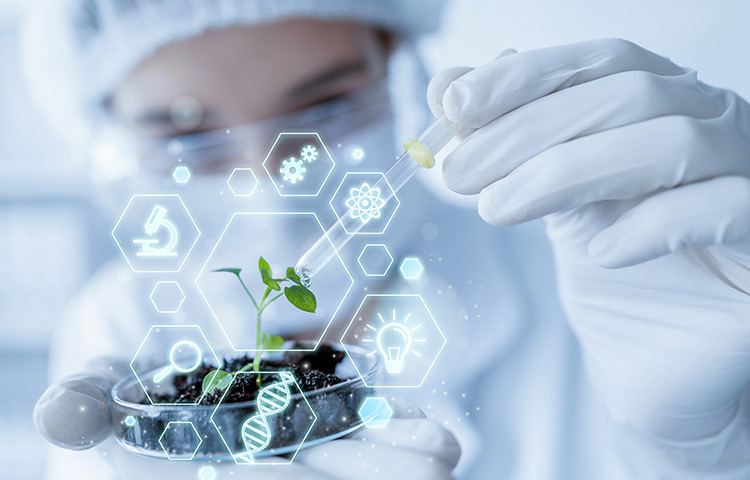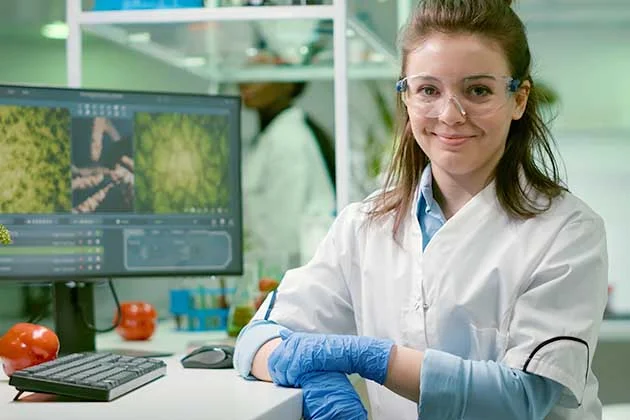
The advent of biotechnology has indelibly transformed the landscape of modern healthcare. This field, at the intersection of biology and technology, has revolutionized the way we understand, diagnose, and treat diseases. As we delve into the multifaceted impact of biotechnology, it becomes evident that this innovative domain holds the key to unprecedented advancements in medical science.
Overview of Biotechnology in Healthcare
Definition and Scope of Biotechnology
Biotechnology is a broad area of science involving the manipulation of living organisms and organic systems to develop products and technologies for specific human applications. In the context of healthcare, biotechnology encompasses the development of therapeutic drugs, diagnostic tools, and advanced treatments that leverage biological processes and cellular components. This definition spans from genetic engineering and cell culture techniques to the creation of bioengineered tissues and advanced medical devices.
Historical Evolution of Biotechnology in Medicine
The historical trajectory of biotechnology in medicine is marked by significant milestones. The discovery of penicillin in 1928 by Alexander Fleming can be seen as an early biotechnological breakthrough. This was followed by the advent of recombinant DNA technology in the 1970s, which enabled scientists to manipulate genetic material and led to the production of synthetic insulin. Over the decades, the field has progressed with the Human Genome Project, which mapped the entire human genetic code, laying the groundwork for personalized medicine. Today, biotechnology is characterized by advancements such as CRISPR gene editing and regenerative therapies, continuing to evolve and reshape healthcare.
Advancements in Medical Biotechnology
Cutting-Edge Biotechnological Innovations
The frontier of medical biotechnology is brimming with groundbreaking innovations. CRISPR-Cas9, a revolutionary gene-editing technology, allows for precise modifications to the genome, offering potential cures for genetic disorders. CAR-T cell therapy, which involves modifying a patient’s T cells to target cancer cells, represents a new paradigm in oncology. Moreover, bioprinting technology, which uses 3D printing to create tissues and organs, holds promise for organ transplantation and regenerative medicine. These innovations are not just theoretical; they are actively being implemented in clinical settings, paving the way for new treatments and therapeutic approaches.
Role of Biotechnology in Drug Development
Biotechnology has revolutionized drug development, making it more efficient and targeted. Traditional drug development processes often involved trial and error and long timelines. In contrast, biotechnological methods utilize genetic and molecular information to design drugs that precisely target disease mechanisms. Biopharmaceuticals, such as monoclonal antibodies and recombinant proteins, have become pivotal in treating conditions ranging from autoimmune diseases to various cancers. These biotechnological advances have not only enhanced the efficacy of treatments but also reduced adverse effects, thereby improving patient outcomes.

Biotechnology and Personalized Medicine
Tailoring Treatments to Individual Genetic Profiles
Personalized medicine, also known as precision medicine, is an innovative approach that tailors medical treatment to the individual characteristics of each patient. This approach is made possible by biotechnological tools that analyze a patient’s genetic profile. By understanding the genetic basis of diseases, healthcare providers can develop personalized treatment plans that target specific genetic mutations. This level of customization enhances the effectiveness of treatments and minimizes side effects, leading to better patient care and outcomes.
Case Studies of Successful Personalized Therapies
Numerous case studies highlight the success of personalized therapies. For instance, the use of trastuzumab (Herceptin) for HER2-positive breast cancer has significantly improved survival rates for patients with this specific genetic marker. Similarly, pharmacogenomics, which involves tailoring drug treatments based on an individual’s genetic makeup, has been effective in treating conditions like epilepsy and depression. These examples demonstrate the tangible benefits of personalized medicine, offering hope for more targeted and effective treatments in the future.
Biotechnology in Disease Diagnosis
Enhanced Diagnostic Techniques Through Biotechnology
Biotechnology has greatly enhanced diagnostic capabilities, enabling earlier and more accurate detection of diseases. Techniques such as polymerase chain reaction (PCR) and next-generation sequencing (NGS) allow for the rapid and precise identification of genetic mutations and pathogens. Biomarker identification, another biotechnological advancement, helps in diagnosing diseases at their nascent stages. These diagnostic tools are critical in managing diseases more effectively, as they provide valuable information that guides treatment decisions.
Early Detection and Its Benefits
Early detection of diseases is crucial for effective treatment and management. Biotechnology has made it possible to identify diseases like cancer and genetic disorders at much earlier stages than before. For example, liquid biopsy, a non-invasive diagnostic tool, can detect cancer by analyzing circulating tumor DNA in the blood. Early detection through such advanced diagnostic methods improves prognosis, allows for timely intervention, and reduces healthcare costs by preventing disease progression.
Biotechnology and Gene Therapy
Understanding Gene Therapy and Its Applications
Gene therapy involves the modification of genes to treat or prevent diseases. This biotechnological approach targets the underlying genetic causes of diseases, offering potential cures for previously untreatable conditions. Gene therapy can be used to replace defective genes with functional ones, inactivate malfunctioning genes, or introduce new genes to help fight diseases. Applications of gene therapy are broad, ranging from treating genetic disorders like cystic fibrosis and hemophilia to addressing complex conditions such as cancer and neurodegenerative diseases.
Breakthroughs and Challenges in Gene Editing
The development of gene editing technologies, particularly CRISPR-Cas9, has marked a significant breakthrough in gene therapy. This technology allows for precise, targeted changes to the DNA, opening new avenues for treating genetic disorders. However, gene editing also presents challenges, including ethical concerns and potential off-target effects. Ensuring the safety and efficacy of gene editing techniques is paramount, and ongoing research is focused on addressing these challenges to realize the full potential of gene therapy.
Biotechnology’s Role in Vaccine Development
Accelerating Vaccine Production with Biotechnology
Biotechnology has played a crucial role in accelerating vaccine development and production. Traditional vaccine development methods often took years, but biotechnological techniques have significantly shortened this timeline. For example, mRNA vaccine technology, used in the development of COVID-19 vaccines, allows for rapid design and production. This technology uses genetic information to instruct cells to produce an immune response, leading to faster and more flexible vaccine development.
Case Study: Biotechnology in COVID-19 Vaccine Development
The rapid development of COVID-19 vaccines is a testament to the power of biotechnology. Companies like Pfizer-BioNTech and Moderna utilized mRNA technology to develop vaccines within months, a process that would typically take years. These vaccines have proven highly effective in preventing COVID-19 and have played a critical role in controlling the pandemic. The success of these vaccines underscores the potential of biotechnology to respond swiftly to global health emergencies.
Biotechnology in Regenerative Medicine
Stem Cell Research and Regenerative Therapies
Stem cell research is a cornerstone of regenerative medicine, offering the potential to repair or replace damaged tissues and organs. Stem cells have the unique ability to differentiate into various cell types, making them ideal for regenerative therapies. Advances in stem cell therapy are paving the way for treatments that can regenerate heart tissue after a heart attack, restore function in spinal cord injuries, and even create new tissues and organs for transplantation.
Real-World Applications and Success Stories
There are numerous success stories in regenerative medicine that highlight the potential of biotechnology. For instance, stem cell therapy has been used to treat patients with severe burns, enabling the regeneration of skin tissue. Additionally, advances in bioprinting technology have led to the creation of functional organ tissues, such as liver and kidney tissues, which could eventually be used for transplantation. These real-world applications demonstrate the transformative impact of regenerative medicine on patient care.
Biotechnology and Cancer Treatment
Innovations in Oncology: Targeted Therapies
Biotechnology has revolutionized cancer treatment through the development of targeted therapies. Unlike traditional chemotherapy, which affects both cancerous and healthy cells, targeted therapies specifically attack cancer cells based on their genetic and molecular profiles. This approach minimizes damage to healthy cells and reduces side effects. Examples of targeted therapies include tyrosine kinase inhibitors and monoclonal antibodies, which have significantly improved outcomes for cancer patients.
Biotechnology’s Role in Immunotherapy
Immunotherapy, which harnesses the body’s immune system to fight cancer, has been revolutionized by biotechnological advances. CAR-T cell therapy, for example, involves modifying a patient’s T cells to recognize and attack cancer cells. This innovative treatment has shown remarkable success in treating certain types of leukemia and lymphoma. The ongoing development of immunotherapies continues to offer new hope for cancer patients, highlighting the critical role of biotechnology in advancing cancer treatment.
Ethical Considerations in Biotechnology
Balancing Innovation with Ethical Responsibility
As biotechnology advances, it is essential to balance innovation with ethical responsibility. The ability to manipulate genetic material and create new biological entities raises significant ethical questions. Issues such as genetic privacy, consent, and the potential for genetic discrimination must be carefully considered. Ensuring that biotechnological research and applications adhere to ethical standards is crucial to maintaining public trust and safeguarding individual rights.
Addressing Public Concerns and Regulatory Challenges
Public concerns about the safety and ethical implications of biotechnological innovations need to be addressed through transparent communication and robust regulatory frameworks. Regulatory agencies play a critical role in overseeing biotechnological research and applications to ensure they are safe and ethical. Addressing these challenges involves collaboration between scientists, ethicists, policymakers, and the public to create regulations that protect individuals while fostering innovation.
Future Prospects of Biotechnology in Healthcare
Emerging Trends and Future Technologies
The future of biotechnology in healthcare is promising, with emerging trends such as synthetic biology, nanomedicine, and digital health poised to revolutionize the industry. Synthetic biology involves designing and constructing new biological parts and systems, which could lead to novel treatments and therapies. Nanomedicine uses nanoscale materials and technologies for diagnosis and treatment, offering targeted and efficient solutions. Digital health, which integrates biotechnological advancements with digital technologies, is transforming healthcare delivery and patient care.
Potential Impact on Global Health Outcomes
Biotechnology has the potential to significantly improve global health outcomes by providing innovative solutions to some of the most pressing health challenges. From combating infectious diseases to addressing chronic conditions, biotechnological advancements will continue to play a crucial role in improving health worldwide. As these technologies become more accessible, they hold the promise of reducing health disparities and enhancing the quality of life for people across the globe.
Conclusion
The transformative impact of biotechnology on modern healthcare is undeniable. From personalized medicine and advanced diagnostics to innovative treatments and regenerative therapies, biotechnology is at the forefront of medical progress. As we look ahead, the continued evolution of biotechnological innovations promises to further enhance healthcare delivery, improve patient outcomes, and address global health challenges. The future of medicine, powered by biotechnology, is bright, offering new hope and possibilities for patients around the world.







